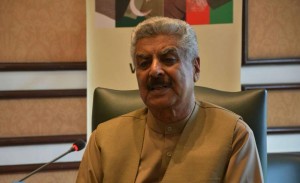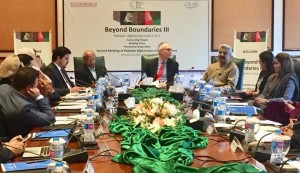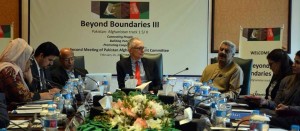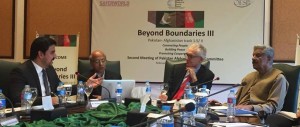During the second visit of the Beyond Boundaries’ Pakistan Afghanistan Joint Committee (PAJC) in Islamabad, as part of the strategic sideline meetings with government and non-government stakeholders, the PAJC members from Afghanistan and Pakistan met with the federal minister for SAFRON, Lt. Gen. (redt) Abdul Quadir Baloch on the status of Afghan refugees in Pakistan, at Serena Hotel, on 26 February, 2018.
Giving the historical background Minister Baloch stated that the issue of Afghan refugees began in 1979 when the Russians moved in Afghanistan and mainly the border areas of Afghanistan, where mostly the Pashtoon tribes lived, got forced to migrate to Pakistan. The number of these refugees rose from 5 to 6 million from 1979 to 1982. That was the time when the international community got alerted and the UN and its specialized agency UNHCR obliged fully. Initially, Pakistan kept all Afghan refugees close to the border, such as mostly in NWFP (at that time) and remaining in Balochistan where they stayed for about a decade or so. Soon the international community started pulling back and their support started decreasing which made it difficult for the government of Pakistan to host the refugees any longer and pay for all their expenses with no support from UNHCR anymore. Following 9/11, due to some factors that caused a pull from the Afghan government side resulted in 2.5 million of the refugees going back whose camps in Pakistan were then closed down. This resulted in about 3.5 remaining in Pakistan.
Coming to the current situation, he stated that as of today, only 30% of them are in camps while the 70% have moved out of the camps and majority have gone away from the border area and have settled around urban centers. Karachi houses the majority of these refugees; followed by Peshawar and Quetta while some are even living in interior Punjab and Islamabad. In the camps they are not being taken care of like they used to before; however, they are provided with water, health facilities and education, to an extent. The first two are aspects that fall under Pakistan’s responsibility by UNHCR. Minister Abdul Qadir Baloch, stated he was sorry to say that this humanitarian problem is not being attended to in the way that it should have been. It is a huge burden and the number is too big while Pakistan also has a serious resource problem. However, the facilities in Pakistani schools, colleges and hospitals are all available to these refugees. Pakistan has also given 3000 scholarships in different Pakistani institutes for their education purpose. Additionally, another fresh allocation of 3000 has commenced and will be allotted to them as well, totaling to 6000 scholarships for Afghan nationals.
He further noted that the Afghans that sought refuge in Pakistan mainly moved towards the profession of agriculture and cattle farming when they moved away from the camps. Of the Afghans residing today, 74% were born in Pakistan since 1979. Most of these young Afghans did not adopt the profession that their parents brought from Afghanistan. Hence, when they are sent back now, they will have difficulties finding job opportunities in Afghanistan. However, SAFRON is in direct talks with their counterparts in Afghanistan who have stated that agricultural land and cattle farming options are available for the returning Afghans. However, for the lot of Afghans that were born in Pakistan and grew up around urban areas will find it difficult to do agricultural labor in Afghanistan and it may be a serious problem.
The government of Pakistan since has been since 1979 treating the issue of Afghan refugees as a purely humanitarian problem. Pakistan tries to create a total disconnect between the issue of refugees and the political relations between the two countries. At the same time, Pakistan also has many limitations and its economy has also suffered at lot due to the refugee problem which should be dealt with some international responsibility as well. Unfortunately, the international community has forgotten about this issue and does not talk about it the same way anymore. SAFRON Minister stated that statistics show that $120 billion worth of burden has affected Pakistan’s economy as a result of Afghan refugees and this has caused a host fatigue.
He further stated that Pakistan made a commitment with UNHCR in 2012 in a tripartite agreement that the return of the Afghan refugees will be voluntary and with dignity and honor. The international community made a commitment of $600 million to be given to Pakistan to be spent over a period of 3 years in areas, called Raha, where the refugees stay. However, 5 years have passed and Pakistan only received $180 million while $420 million is still yet to come in. SAFRON Minister stated that his fear is that due to this host fatigue, if problem prolongs, it will cause an uprising.
Minister Baloch told the Afghan and Pakistan delegates that In 2016, UNHCR provided a repatriation package which includes $200 per returning refugee. When the new UNHCR High Commissioner Filippo Grandi came to Pakistan, he agreed to double this package, to $400. Most of the Afghan families are big in number ranging from 25 to 35 and so the total amount given to them became 900,000 to 1000,000 PKR which became sufficient for them to build a house in Afghanistan. Under this plan, 640,000 Afghans voluntarily returned to Afghanistan. Of those, 70% have reported to be satisfied with their living conditions there.
He informed the groups that the present Government of Afghanistan has been far more serious about this issue as compared to their predecessors and there is a 15 member High Council on refugees which is doing a lot regarding their repatriation. Pakistan is also demanding that Afghanistan should make some policies that are refugee specific, such as have a job quota for the returning Afghans.
Elaborating on government of Pakistan position, he stated that starting from April 1, 2018, repatriation of Afghan refugees will be done in three categories. The first category of 1.4 million will receive $200 per head upon their entry into Afghanistan through Torkham. The second category includes those that have an Afghan Citizen Card (AAC) who were all documented with the collaboration between both governments and the figure is nearly 900,000; the figure is likely to go up to 1000,000. SAFRON Minister stated that if his Ministry receives an extension till the end of March, they will try to document the third category of remaining unknown and undocumented Afghans residing in Pakistan and if any Afghans do not get registered in this phase, then that lot will be considered as aliens. They will also be treated as aliens are treated. Regarding AAC holders, Pakistan also has a plan that it will work on along with the government of Afghanistan from 1st week of May, 2018, he stated.
SAFRON Minister also stated till now: “we have had no evidence or serious complaints of refugees being involved in terrorism or any terrorist activities is considered. There could have been some instances of street crimes. But, the locals and the refugees have been peacefully co existing”.
Mr. Mozammil Shinwari, Advisor to Afghanistan CEO on Trade and Regional Cooperation also the head of the Afghan delegation, speaking from Afghan side said that the CEO and President have had extensive cabinet meetings to chalk out a plan for refugees return, settlement and sustainability through providing livelihoods and other measures. Afghanistan is working on a proposal to have all its refugees return to Afghanistan and live and contribute to economy in their own country. But, this has to be gradual, and realistic time-frame spread over a period of two years. Once the proposal is ready, it will be shared with Pakistan. He also informed SAFRON Minister that recently Afghan government has formed the High Council for Refugees at national level.
In view of recent postponement of SAFRON Minister’s visit to Kabul, he requested the Minister to visit Kabul at the soonest may be end-March, so that the two governments can jointly work on the proposal for resettlement of refugees within next two years.
In his concluding remarks, the minister reiterated that the Afghan refugee should be dealt with as a humanitarian issue. He said he looked forward to receiving the Afghan proposal on settlement of refugees in a span of two years. He said his ministry will then present proposal and recommendations to the Federal cabinet to consider the plan.




